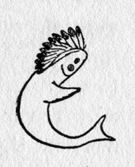Long, long time ago the Laguna Indians used to live down by the ocean. One of the Indian men lived alone with his little daughter Thun-tsay (Sunlight). Thun-tsay did not have a mother. Her father thought she was lonely, so he brought a new mother to his house. This new mother had a little girl of her own, Cohn-nah (Darkness). She did many nice things for her Cohn-nah; but she treated Thun-tsay very unkindly. So Thun-tsay used to run away from her step-mother down to the beach, and make herself happy gathering shells and playing in the sand.

One day she found a little fish that had been left in a pool of water on the sand when the tide went out.
"Thun-tsay," said the little fish, "I am hungry. Won't you please give me something to eat?"
So Thun-tsay ran home and got bread crumbs for the little fish; and every day for four days she fed him. On the fourth day he asked her, "Please throw me back into the ocean and I will give you a present."
Thun-tsay picked up the little fish and threw him back into the ocean; and as she did so he said to her, "Go home and comb your hair and you will find my present."

Thun-tsay ran home as fast as she could and got her bunch of straw, that she brushed and combed her hair with, and began brushing it at once. And as she brushed all kind of beautiful things fell out. She was rich with gifts and she had plenty to share with her father.
When her step-mother found out what had happened to Thun-tsay, she sent her own daughter Cohn-nah down to the beach to look for the little fish, so that he might give Cohn-nah presents, too.
She found the little fish once more in a pool of water.
"Please give me some food, Cohn-nah," asked the little fish, "for I am very hungry."
But Cohn-nah laughed and threw sand into the water. Then she went away and left the little fish.
Next day Cohn-nah went down to the beach where the little fish begged again for food; and again she threw sand at him. He begged her on the third day and on the fourth day he said, "Please throw me back into the ocean and I will give you a present. Go home and comb your hair and you will find my present."
Cohn-nah picked him up quickly and threw him into the ocean. Then she ran home and told her mother, "Get my comb. The fish has promised me a present, too." But when Cohn-nah combed her hair, it all fell out over the floor and there were no presents.
Her mother was angry and she treated Thun-tsay meaner than ever. So Thun-tsay began to go to the beach again every day to get away from her step-mother.
One day a big fish came up out of the water near her. "Thun-tsay," he said, "I am the little fish that you fed. I have grown to be chief of the fishes now. Won't you come down into the ocean with me and be my bride? I have beautiful things waiting for you."
So Thun-tsay jumped into the ocean and went down to live with the big Fish-Chief. She lived happily with him for a long time; until one day she grew homesick to see her father.

"Please let me go back home to see my father, Fish-Chief?" asked Thun-tsay.
"All right, you may go," said Fish-Chief, "and here are presents to take to him; but you must promise me to come back again at the end of six months."
"I will come back," replied Thun-tsay, so Fish-Chief took her up to the shore and she went home.
She found her father so sick from grieving over Thun-tsay's disappearance that even her step-mother was glad to have her return. Her father got well and Thun-tsay was again so happy that she forgot all about her promise to Fish-Chief.
But one day as she was walking along the beach, she saw poor Fish-Chief lying on the sand almost dead. He was grieving himself to death. Thun-tsay ran to him.
"I can not live without you, Thun-tsay. It is too lonely in my palace when you are gone. If you do not go back into the ocean with me, I shall die. You may live with your father half of the time; but if you do not come back to me for the other half I cannot live."

He was grieving himself to death
So Thun-tsay went back with Fish-Chief and lived happily ever after, spending half of the time in the Fish palace and half of the time with her father.
This chapter has been put on-line as part of the
BUILD-A-BOOK Initiative at the
Celebration of Women Writers.
Initial text entry and proof-reading of this chapter were the work of volunteer
Lynnette Saar.